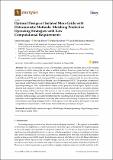| dc.contributor.author | Micangeli, Andrea | |
| dc.contributor.author | Fioriti, Davide | |
| dc.contributor.author | Cherubini, Paolo | |
| dc.contributor.author | Duenas Martinez, Pablo | |
| dc.date.accessioned | 2020-09-01T15:18:50Z | |
| dc.date.available | 2020-09-01T15:18:50Z | |
| dc.date.issued | 2020-08 | |
| dc.date.submitted | 2020-06 | |
| dc.identifier.issn | 1996-1073 | |
| dc.identifier.uri | https://hdl.handle.net/1721.1/126867 | |
| dc.description.abstract | The lack of electricity access is increasingly concentrated in rural areas of developing countries, in which mini-grids are often a suitable solution; however, given the high risks, it is crucial to minimize costs. This paper aims at analyzing existing methodologies for the optimal design of mini-grids combined with different operating strategies. Typical system operations, like the load-following (LFS) and cycle charging (CCS) strategies, are compared with the more demanding predictive strategies based on Mixed-Integer Linear Programming (MILP). The problem is formulated and solved with Particle Swarm Optimization (PSO), so to simulate traditional and predictive operating strategies. Two reformulations based on the proposed Search Space Update are also detailed and compared with the so-called one-shot MILP model, which is able to con-jointly optimize both the design and the operation of the system, in order to reduce computational requirements with the predictive strategy. The results, tailored with data from a rural mini-grid in Kenya, highlight that heuristic methodologies can perform better than the traditional MILP approach, both in terms of optimality and computational time, especially when advanced operating strategies are considered. Conventional operating strategies (LFS or CCS) appear to be sub-optimal, but require very little computational requirements, which makes them suitable for preliminary designs. | en_US |
| dc.publisher | Multidisciplinary Digital Publishing Institute | en_US |
| dc.relation.isversionof | 10.3390/en13164214 | en_US |
| dc.rights | Creative Commons Attribution | en_US |
| dc.rights.uri | https://creativecommons.org/licenses/by/4.0/ | en_US |
| dc.source | Multidisciplinary Digital Publishing Institute | en_US |
| dc.title | Optimal Design of Isolated Mini-Grids with Deterministic Methods: Matching Predictive Operating Strategies with Low Computational Requirements | en_US |
| dc.type | Article | en_US |
| dc.identifier.citation | Micangeli, Andrea et al. "Optimal Design of Isolated Mini-Grids with Deterministic Methods: Matching Predictive Operating Strategies with Low Computational Requirements." Energies 13, 16 (August 2020): 4214 ©2020 Author(s) | en_US |
| dc.contributor.department | MIT Energy Initiative | en_US |
| dc.relation.journal | Energies | en_US |
| dc.eprint.version | Final published version | en_US |
| dc.type.uri | http://purl.org/eprint/type/JournalArticle | en_US |
| eprint.status | http://purl.org/eprint/status/PeerReviewed | en_US |
| dc.date.updated | 2020-08-21T13:51:41Z | |
| dspace.date.submission | 2020-08-21T13:51:41Z | |
| mit.journal.volume | 13 | en_US |
| mit.journal.issue | 16 | en_US |
| mit.license | PUBLISHER_CC | |
| mit.metadata.status | Complete | |
